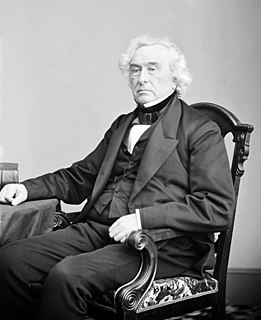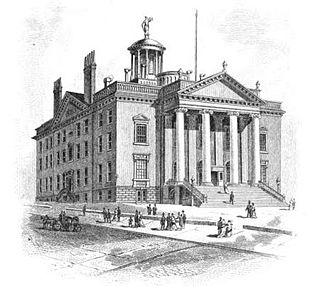
Francis Granger was an American politician who represented Ontario County, New York in the United States House of Representatives for three non-consecutive terms. He was a leading figure in the state and national Whig Party, particularly in its moderate-conservative faction. He served as a Whig vice presidential nominee on the party's multi-candidate 1836 ticket and, in that role, became the only person to ever lose a contingent election for the vice presidency in the U.S. Senate. He also served briefly in 1841 as United States Postmaster General in the cabinet of William Henry Harrison. In 1856, he became the final Whig Party chairman before the party's collapse, after which he joined the Constitutional Union Party.
The Commission to Explore a Route for a Canal to Lake Erie and Report, known as the Erie Canal Commission, was a body created by the New York State Legislature in 1810 to plan the Erie Canal. In 1817 a Canal Fund led by Commissioners of the Canal Fund was established to oversee the funding of construction of the canal. In 1826 a Canal Board, of which both the planning commissioners and the Canal Fund commissioners were members, was created to take control of the operational canal. The term "Canal Commission" was at times applied to any of these bodies. Afterwards the canal commissioners were minor state cabinet officers responsible for the maintenance and improvements of the state's canals.

John Allen Collier was an American lawyer and politician.
Jonas Earll Jr. was an American politician. He was a U.S. Representative from New York from 1827 to 1831.
George Rex Davis was an American lawyer and politician from New York. He was Speaker of the New York State Assembly in 1831 and 1843.

The 1846 New York state election was held on November 3, 1846, to elect the governor, the lieutenant governor and two Canal Commissioners, as well as all members of the New York State Assembly and eight members of the New York State Senate.
Stephen Clark was an American politician who served as the 23rd Treasurer of New York State.
Orville Luther Holley was an American writer, newspaper editor, historian and politician.
George Hezekiah Boughton was an American politician.
Daniel Perez Bissell was an American physician and politician from New York.
John T. Hudson was an American politician from New York.
Nelson John Beach was an American surveyor, businessman and politician from New York.
Charles Cook was an American politician from New York.

The 1847 New York state election was held on November 2, 1847, to elect the lieutenant governor, the secretary state, the state comptroller, the attorney general, the state treasurer, the state engineer, three Canal Commissioners and three Inspectors of State Prisons, as well as all members of the New York State Assembly and the New York State Senate.

The 62nd New York State Legislature, consisting of the New York State Senate and the New York State Assembly, met from January 1 to May 7, 1839, during the first year of William H. Seward's governorship, in Albany.
Elijah Rhoades was an American politician from New York.

The 67th New York State Legislature, consisting of the New York State Senate and the New York State Assembly, met from January 2 to May 7, 1844, during the second year of William C. Bouck's governorship, in Albany.

The 68th New York State Legislature, consisting of the New York State Senate and the New York State Assembly, met from January 7 to May 14, 1845, during the first year of Silas Wright's governorship, in Albany.
William Henry Van Schoonhoven was an American lawyer and politician from New York.

The 70th New York State Legislature, consisting of the New York State Senate and the New York State Assembly, met from January 5 to December 15, 1847, during the first year of John Young's governorship, in Albany.